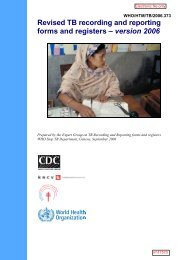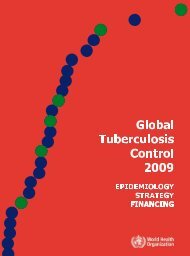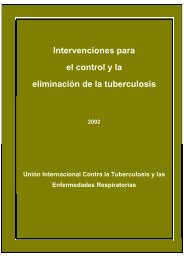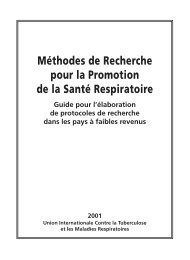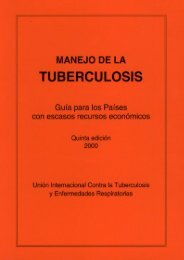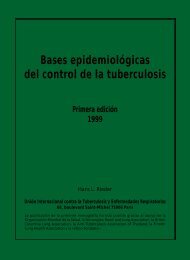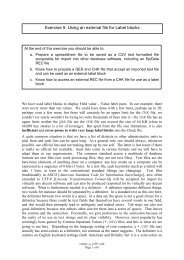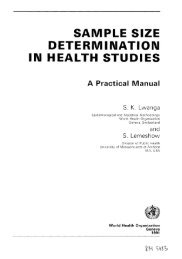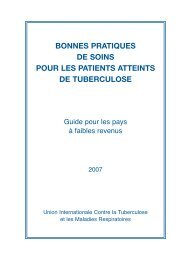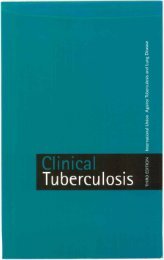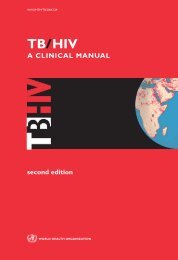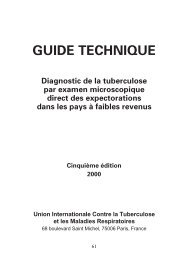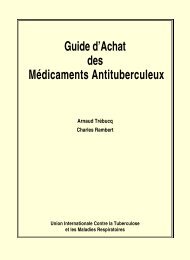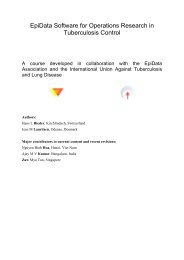Interventions for Tuberculosis Control and Elimination 2002
Interventions for Tuberculosis Control and Elimination 2002
Interventions for Tuberculosis Control and Elimination 2002
You also want an ePaper? Increase the reach of your titles
YUMPU automatically turns print PDFs into web optimized ePapers that Google loves.
had a more rapid decrease in pericardial effusion as compared to those not<br />
given corticosteroids. 940<br />
Prospective studies evaluating the use of corticosteroids in the treatment<br />
of tuberculous pericarditis were conducted in the Transkei area of<br />
South Africa. 941-944 These studies showed that fewer patients with acute<br />
effusive pericarditis on corticosteroids required repeated drainage, 941 <strong>and</strong><br />
patients with effusive-constrictive pericarditis had faster improvement. 942<br />
In neither study were there differences in constriction, but among patients<br />
with acute effusive pericarditis, corticosteroid recipients had a lower risk<br />
of death. Among HIV-infected patients in Harare, Zimbabwe, corticosteroids<br />
significantly reduced case fatality. 945<br />
From these studies it would seem that adjuvant treatment with corticosteroids<br />
is indicated in patients with pericardial tuberculosis.<br />
Peritoneal tuberculosis<br />
Because of the similarity in the pathogenesis of peritoneal <strong>and</strong> pericardial<br />
tuberculosis, both involving serous membranes, a beneficial effect of corticosteroid<br />
use in peritoneal tuberculosis similar to that in pericardial tuberculosis<br />
might be expected. 946 Alternatively one may argue that tuberculous<br />
peritonitis is more similar to tuberculous pleurisy. In a retrospective study<br />
from Saudi Arabia, the frequency of recurrent abdominal pain <strong>and</strong> emergency<br />
department visits were used as endpoints to compare the usefulness<br />
of corticosteroid adjunctive therapy. 947 Corticosteroids appeared to have an<br />
effect in reducing the frequency of these events. However, as the study<br />
was a retrospective evaluation of a case series comparing patients who were<br />
given corticosteroid therapy with patients who had not received corticosteroids,<br />
it is not possible to draw firm conclusions. A prospective trial, allocating<br />
patients to a three-month course with either prednisone or placebo,<br />
was carried out with death <strong>and</strong> intestinal obstruction evaluated as endpoints.<br />
948 Corticosteroid-treated patients fared better, but the small sample<br />
size did not detect a significant difference in the frequency of these events.<br />
The evidence <strong>for</strong> the usefulness of corticosteroid treatment as adjunctive<br />
treatment in peritoneal tuberculosis is sufficiently convincing to recommend<br />
its routine use.<br />
Meningeal tuberculosis<br />
Adjunctive treatment with corticosteroids in meningeal tuberculosis has been<br />
widely reported. 949-964 However, not all of the published reports were<br />
prospective, controlled trials.<br />
149



